
Dr. Robert Mogielnicki is a Resident Scholar at the Arab Gulf States Institute in Washington. He manages the institute’s political economy research and oversees “Next Gen Gulf” — a long-term research series that examines how advanced technologies shape Gulf Arab governments and economies.
Regional governments are jockeying for greater influence in a post-coronavirus order by implementing new socio-economic policies, heightening economic competition, and racing to vaccinate their populations.
The UAE announced new legal changes permitting certain expatriates to receive Emirati citizenship. Symbolically, the decision reflects a major development within a socio-economic domain that has been marked by controversy in previous years. Some Emiratis worry about the economic, social, and cultural implications of extending citizenship to expatriates. In practice, federal- and emirate-level governments in the UAE have rolled out a number of policies permitting specialized and talented expatriates to stay in the country longer. The UAE’s launch of a 10-year golden visa system in 2019 was followed by additional visa options targeting retired expatriates and those engaged in remote work. In March 2021, Dubai’s government announced that it will grant 1,000 cultural visas to artists and other creators.
The coronavirus pandemic and the oil price rout of 2020 initiated an exodus of expatriates from the Gulf. S&P Global Ratings estimated that Dubai experienced a population contraction of 8.4% in 2020 — the sharpest decline in the region. The Dubai Statistics Center refuted these figures and indicated that the emirate’s population grew by 1.6%. Regardless of the precise population measurements, UAE endeavors to expand eligibility for Emirati citizenship and long-term residence are part of a concerted effort to retain and attract the talented expatriate residents needed for a robust economy. The naturalization procedure appears to depend on nomination by members of the government or royal court officials as opposed to an objective application process. It is also unclear whether naturalized expatriates will be entitled to the same benefits afforded to local Emiratis.

On 15 February 2021, the Saudi government announced that foreign firms’ eligibility to secure government contracts would be linked to the presence of regional headquarters in Saudi Arabia by 1 January 2024. Saudi officials hope that the decision will generate new jobs for Saudis, transfer expertise, and localize knowledge. Yet it also reflects an invitation for more global expatriates to take part in the country’s ongoing economic and social transformation under Vision 2030. The commercial policy may dampen demand for nearby business hubs in Bahrain and the UAE, which have traditionally been used by multi-national firms as bases for accessing the Saudi market and those of other countries in the region. Rather than drawing a firm line in the sand, Saudi officials are more likely to use the announcement as a call for dialogue with interested elements of the global business community. In March, Oman’s sultan also approved an economic incentive plan that included the eventual granting of long-term residence visas to foreign investors.
The Iraqi government eased visa requirements following the high-profile visit of Pope Francis to the country in early March. Citizens from more than 35 countries — including permanent members of the UN Security Council and other European and Asian countries — are no longer required to make visa arrangements in advance and can now pay for visas on arrival at Iraqi ports of entry. Iraq’s government hopes that the new measures will stimulate tourism, encourage investments, and create employment. However, ongoing security challenges and persistent protests are likely to weigh on investor confidence and dampen demand for tourism.
Mobility and migration dynamics in 2021 will be driven largely by how regional states respond to ongoing coronavirus-related challenges and concerns. Bahrain, Israel, and the UAE have among the highest coronavirus vaccination rates in the world. The UAE in particular has publicized the coronavirus-related safety measures adopted by its public and private sectors to convey that the country has moved beyond strict containment measures and rather functions as a safe destination for global travelers. Smaller, wealthier countries of the Middle East and North Africa (MENA) that can demonstrate rapid vaccination progress will enjoy economic benefits arising from increased economic activity and the utilization of travel corridors throughout 2021. As larger, poorer countries struggle to vaccinate their populations, these parts of the MENA region will continue to face intermittent lockdowns and wariness on the part of global visitors and international investors.
References
Abbas, W. “Dubai is Open, Safest City in the World: Top Officials.” Khaleej Times. Galadari Printing and Publishing LLC., March 1, 2021.
“DSC: Dubai Population Is 3.4 Million and Hosts 4.4 Million Daily.” DSC. Dubai Statistics Center - Government of Dubai , March 7, 2021.
“Dubai to Issue 10-Year ‘Cultural Visa to 1,000 People around the World.” Zawya. Khaleej Times, March 2, 2021.
Gupta, Z. “Expat Exodus Adds To Gulf Region's Economic Diversification Challenges.” S&P Global Ratings. S&P Global, February 15, 2021.
“HM Approves Economic Stimulus Plan.” Oman Observer. Ministry of Information, March 9, 2021.
“Iraq Eases Visa Restrictions.” Tamimi.com. Al Tamimi & Company, March 16, 2021.
Jarallah, J, and Al Nowais, S. “UAE to Grant Emirati Citizenship to ‘Talented and Innovative’ People.” The National News. The National FZ LLC., January 30, 2021, updated February 1, 2021.
Lee, J. “Iraq Relaxes Visa Restrictions.” Iraq-Business News. Iraq Business News. March 16, 2021.
“Official Source: Saudi Arabia Will Stop Contracting with Any Company or Firm That Has Regional Headquarters Outside Saudi Arabia, Starting From 2024.” SPA. Saudi Press Agency, February 15, 2021.